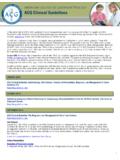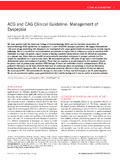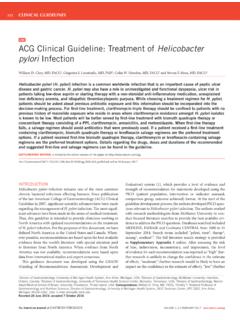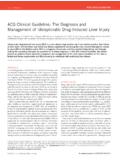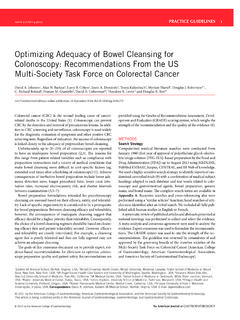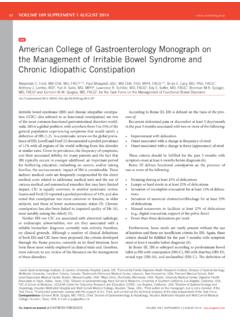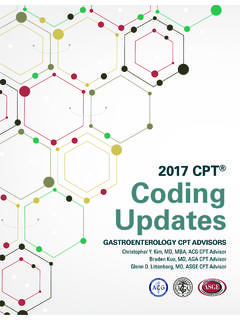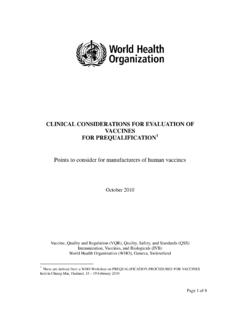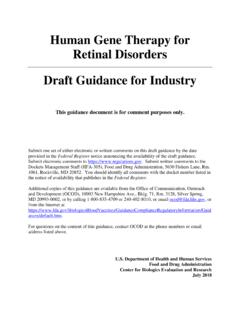Transcription of ACG Clinical Guideline: Preventive Care in Inflammatory ...
1 241 2017 by the American College of Gastroenterology The American Journal of GASTROENTEROLOGYCLINICAL guidelines INTRODUCTION Th e purpose of this article is to review Preventive care for the infl ammatory bowel disease (IBD) patient. Health maintenance issues include assessment for vaccinations, screening for cervical cancer, melanoma and non-melanoma skin cancer (NMSC), and osteoporosis. Identifi cation of depression and anxiety and smok-ing cessation in IBD patients will also be reviewed. To accomplish these goals, coordination between the primary care provider, gas-troenterology team and other specialists is necessary.
2 Colorectal dysplasia surveillance and management will not be addressed in this review. As part of this guideline preparation, a literature search was con-ducted using Ovid MEDLINE from 1946 to 2015, EMBASE 1988 to 2015, and SCOPUS from 1980 to 2015. Th e major terms were the controlled subject headings in MeSH: IBDs, colitis, ulcerative, and Crohn s disease. Th ese were translated into the EMTREE controlled vocabulary as enteritis, ulcerative colitis (UC), and Crohn s disease (CD). Words in the title for these diseases were also included. Th e balance of the search involved the concepts of interest, including vaccination, immunizations, specifi c vaccines and diseases, as well as screening, cervical cancer, melanoma, NMSC, smoking, depression, osteoporosis, etc.
3 Th e results were limited to trials, meta-analyses, systematic reviews, and existing guidelines . In some areas where trials were unavailable cohort studies and reviews were included. Each author performed an updated literature search in 2016 to include more recently published articles. To evaluate the level of evidence and strength of recommen-dations, we used the Grading of Recommendations Assessment, Development, and Evaluation (GRADE) system ( 1 ). Th e level of evidence could range from high (implying that further research was unlikely to change the authors confi dence in the estimate of the eff ect), moderate (further research would be likely to have an impact on the confi dence in the estimate of eff ect), low (fur-ther research would be expected to have an important impact on the confi dence in the estimate of the eff ect and would be likely to change the estimate), or very low (any estimate of eff ect is very uncertain).
4 Th e strength of a recommendation was graded as strong when the desirable eff ects of an intervention clearly outweigh the undesirable eff ects and as conditional when there is uncertainty about the trade-off s. We preferentially used meta-analyses or systematic reviews when available, followed by clini-cal trials and retrospective cohort studies. To determine the level ACG Clinical Guideline: Preventive care in Infl ammatory Bowel Disease Francis A. Farraye , MD, MSc, FACG 1 , Gil Y.
5 Melmed , MD, MS, FACG 2 , Gary R. Lichtenstein , MD, FACG 3 a n d S u n a n d a V. K a n e , M D , M S P H , F A C G 4 Recent data suggest that infl ammatory bowel disease (IBD) patients do not receive Preventive services at the same rate as general medical patients. Patients with IBD often consider their gastroenterologist to be the primary provider of care . To improve the care delivered to IBD patients, health maintenance issues need to be co-managed by both the gastroenterologist and primary care team.
6 Gastroenterologists need to explicitly inform the primary care provider of the unique needs of the IBD patient, especially those on immunomodulators and biologics or being considered for such therapy. In particular, documentation of up to date vaccinations are crucial as IBD patients are often treated with long-term immune-suppressive therapies and may be at increased risk for infections, many of which are preventable with vaccinations. Health maintenance issues addressed in this guideline include identifi cation, safety and appropriate timing of vaccinations, screening for osteoporosis, cervical cancer, melanoma and non-melanoma skin cancer as well as identifi cation of depression and anxiety and smoking cessation.
7 To accomplish these health maintenance goals, coordination between the primary care provider, gastroenterology team and other specialists is necessary. SUPPLEMENTARY MATERIAL is linked to the online version of the paper at Am J Gastroenterol 2017; 112:241 258; doi: ; published online 10 January 2017 1 Section of Gastroenterology, Boston Medical Center, Boston University School of Medicine , Boston , Massachusetts , USA ; 2 Division of Gastroenterology, Department of Medicine, Cedars-Sinai Medical Center , Los Angeles , California , USA ; 3 Division of Gastroenterology, Hospital of the University of Pennsylvania, Perelman School of Medicine of the University of Pennsylvania , Philadelphia , Pennsylvania , USA ; 4 Division of Gastroenterology and Hepatology, Mayo Clinic , Rochester , Minnesota , USA.
8 Correspondence: Francis A. Farraye, MD, MSc, FACG, Section of Gastroenterology, Boston Medical Center, Boston University School of Medicine , 85 East Concord Street , Boston , Massachusetts 02118 , USA . E-mail: Received 22 January 2016 ; accepted 10 October 2016 CMEF arraye et al. The American Journal of GASTROENTEROLOGY VOLUME 112 | FEBRUARY 2017 242of evidence, we entered data from the papers of highest evidence into the GRADE program (accessible at ). Th e recommendation statements from this guideline are shown in Ta b l e 1.
9 Summary statements, when listed, are designed to be descriptive in nature without associated evidence-based ratings. VACCINATIONS Recent data suggest that IBD patients do not receive Preventive services at the same rate as general medical patients ( 2 ). Members of the gastroenterology team are oft en the only clinicians that a patient with IBD will see. As such, it is incumbent upon gastro-enterologists to take a proactive role in the health care needs of their IBD patients ( 3 5 ). It is crucial to clarify with the patient the limits of the specialist s responsibilities and delegate rou-tine health care issues to the primary care clinician.
10 It is equally important to educate the primary care clinician to the unique health maintenance needs of the IBD patient, especially those on immunomodulators and biologic agents. Although it appears that both primary care clinicians and gastroenterologists are hesitant to take ownership of vaccinations ( 6 8 ), it is reasonable ( 9 ) that vaccination recommendations be the responsibility of the treating gastroenterologist, but the actual delivery/adminis-tration of these vaccines may be a shared responsibility ( 10 13 ). Communicating specifi c recommendations to the primary care team in a concise fashion are needed.
